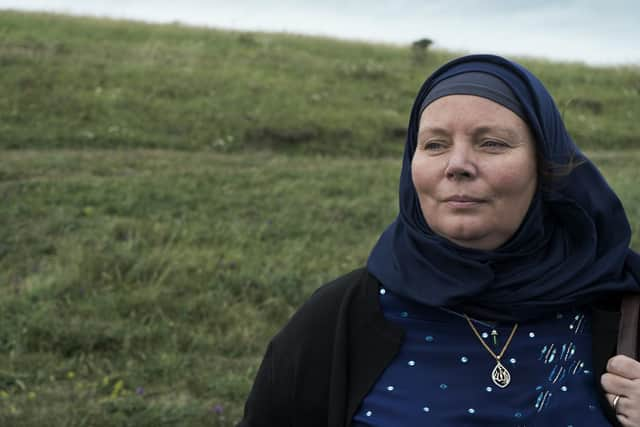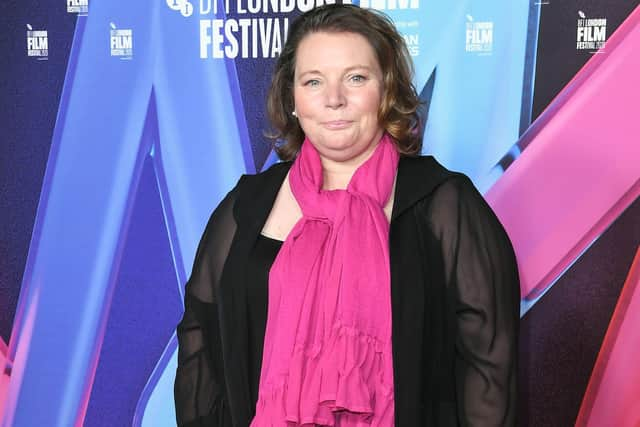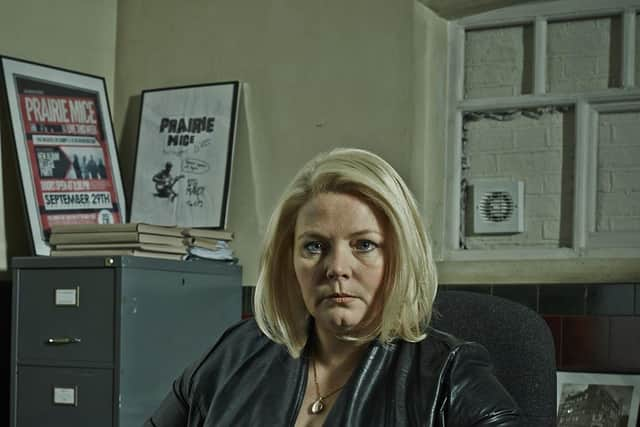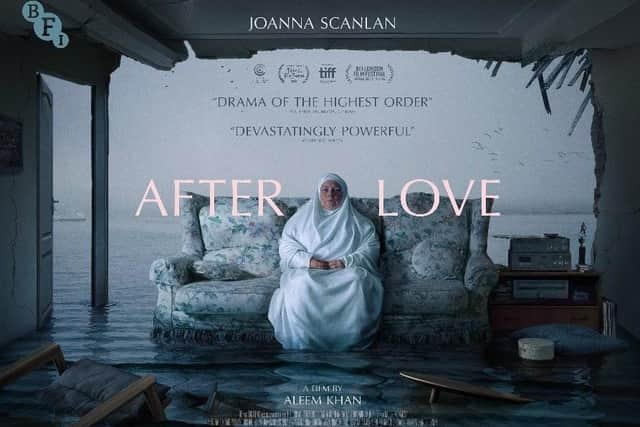Why Joanna Scanlan loves subverting expectations in her new film, After Love


“Not a happy woman,” says Scanlan of her latest role, sounding very much the opposite, at home on a day off from filming. Today she’s promoting After Love, the debut feature by writer and director Aleem Khan, in which she stars as the lead.
Released this week, it is already winning awards and acclaim at festivals, including Cannes 2020 Critics’ Week, Telluride, Dublin, Rome and London Film Festivals, with Best Actress Award for Scanlan at Thessaloniki International Film Festival.
After Love sees Scanlan in the lead role as Mary Hussain, the beating heart of the film, playing a woman who converted to Islam when she married and living happily in Dover with her husband, Ahmed, who works on the Channel ferries. When he dies suddenly, she is hit by the discovery he had a secret life in Calais, and sets off to find out more. Alongside Scanlan is Nasser Memarzia as her husband, Nathalie Richard as his mistress, and Talid Ariss as his son.
Scanlan is in the middle of a day of press interviews, speaking from Croydon in South London where she lives with husband Neil, an accountant who pops his head round the door and offers his parched partner a cup of tea. “Lovely,” she says.
He sounds it, which is obviously what Scanlan thought when they met at a yoga festival in Devon in 2007 and married two years later.
Life is sweet for Scanlan, now 59, ever since her ‘casting age’ caught up with her real age and the jobs started to come, after fighting to get into the business when she was younger. Graduating from Cambridge and being a member of the university’s Footlights with twentysomething productions and Edinburgh summers under her belt, nevertheless her career stalled and she didn’t turn professional until she was 34.
“I just couldn't get in,” she explains. “Couldn’t find a way in to the profession. I didn’t arrive as an ingenue and was never going to be that, casting bracket-wise, in my twenties. I needed to catch up with my own natural setpoint casting age.”


Before that she had to deal with rejection, despite having won Best Actress at the National Student Drama Festival and having the highest marks in the country for drama.
“All of that meant nothing. You're in a market place. And how are you going to provide something somebody might want?”
So Scanlan went into teaching at Leicester Polytechnic and while she was at it, got herself a drama school education.
“I was lucky to be teaching on a performance, dance, drama and music course and I participated in as many classes by my teaching peers as possible. Then I thought ‘I was put on this earth to do this rather than teach it’ - I should get on with it.”


Which is what she did, aside from a detour working at the Arts Council, which she later drew on for the role of press officer Terri Coverley in the popular political comedy, The Thick of It with Peter Capaldi, from 2005–2012. By then the jobs had already started to come, and her gift for writing as well as performing comedy also saw her teaming up with Jo Brand and Vicki Pepperdine in Getting On (2009–2012), the dark comedy drama series about life on a geriatric ward, which saw her nominated for three BAFTA TV Awards including two for Best Writing. She paired up with Pepperdine again for Puppy Love in 2014, taking her Battersea rescue dog Millie the Staffy along for the ride. She shone once more as indomitable and unorthodox cop boss 'Viv Deering' in three series of No Offence, Paul Abbott's BAFTA nominated and RTS award-winning primetime drama which managed to be gritty and witty at the same time.
“I loved being Viv,” she says. “She’s my hero. She cuts the crap in a brilliant way and is passionate as well. She’s her own woman and a great leader.”
Scanlan also excels in heavier emotional roles such as The Accident, Channel 4’s 2019 series with Sarah Lancashire, playing the mother of a child killed in a building site explosion, and in Deborah Haywood’s 2017 film, Pin Cushion with Lily Newmark, as mother and daughter small town outcasts, while other film accomplishments include Girl With a Pearl Earring (2003), Notes on a Scandal (2006), The Invisible Woman (2013), and Bridget Jones's Baby (2016).
Despite doing multiple interviews back to back today, Scanlan is warm and obligingly chatty.


“I’m a bit more of a conversation type person than an interview type person,” she says. “You don't want to feel like you're just a machine - you want to have a conversation with somebody. What about you, what do you think?”
And so it unfolds as she tells me about After Love, an absorbing, meditative and beautifully-filmed story. Often with only face visible thanks to a hijab and the painterly Alison Watt drapes of her shalwar kameez, Scanlan holds the gaze from start to finish.
With its careful composition, brilliant use of light and domestic intimacy, the interior scenes have a Dutch Golden Age feel, while the White Cliffs of Dover and the English Channel add a cinematic swoop as grief propels Mary into a course of action that gives the film what Scanlan calls a fantastic ‘I don’t know where this is going quality’.
“On one hand it's like a psychological thriller and on the other, a very beautiful dreamscape, and there are moments of intersection. It’s realistic in a slightly mythic way, because you've got this channel of water that the boat crosses and it’s like the River Styx. There’s an archaic mythological element to it. One of the hard things about shooting was I wasn't sure how to play the tone, and of course at a certain point you have to just do it.”
Drawing on elements of his own background, writer and director Aleem Khan, along with producer Matthieu de Braconier and the cast, have made a film that is full of the unexpected.
“It’s a film of nuance and surprise, that subverts expectations,” says Scanlan. “Aleem has talked a lot about identity as being fundamental to it, and from my character’s position, it’s around faith. Mary’s relationship with faith is extremely important, not just literally the faith of Islam and her simple devotional practice, but also faith in love itself. She is somebody who loves and is loving, and then all of that is utterly fragmented by what she discovers. She has to rise above her bad behavior to find love again, so it’s an archetypical lost and found story, although we don't know what she's lost until near the end.”


Faced with the evidence of her husband’s duplicity Mary heads off over the Channel to Calais to confront the reality of his hidden life, and on arrival her hijab sees her mistaken for a cleaner, an assumption she goes along with.
“It's about race and its relationship to class, about economic realities, and about the French and British too. I think there's a hierarchy of femininity between the British woman and the French woman, one looking down on another and making assumptions, which proved to be her undoing really.”
Scanlan describes how she prepared to play a English woman who converted to Islam to marry, starting with the script. As the film is influenced by first-time director Khan’s own upbringing, while it is not autobiographical, some of the situations come from his own experience.
“I talked a lot with Aleem to unpack his experience and what he wanted to tell. His mum is a white working-class woman from Walthamstow who met his dad when she was in her teens and they went on to marry and have six children, of which he is the second. He's used elements of this in the story, and it's hugely empathetic to Mary. I think that speaks to Aleem’s respect and love for his family. So I spent a lot of time understanding the script and where it comes from, then I spent time with his mum who's just a wonderful person, and took a lot of inspiration from that situation.”
She also did a lot of reading, learned some Urdu and Arabic and the prayers she recites, and explored going about life wearing shalwar kameez and hijab.
“That was interesting. I felt really comfortable and protected by them. I've always been somebody who likes to get up in the morning and not have to think too much about what I'm going to wear, and I like the way it fits my body. I just felt safe within it and also very comfortable, and I could just get on with life. I didn't have to think too much about whether this was attractive or not. I mean that's the simplest thing, and it’s almost embarrassing to admit, but every day as a woman I get up and think, what's the MINIMUM I can get away with in terms of like presentablity and feminine attractiveness!” She laughs.
“Yeah, the absolute minimum, because I'm only going to get to the minimum. And suddenly that just disappeared completely when I was wearing the shalwar kameez. I just found it released me.”
Dressed in traditional Islamic clothing, Scanlan was able to observe and blend in, going shopping and spending a lot of time in East Ham in London, buying jewellery from the Pakistani jewellery shops, and visiting the mosque.
“We spent a lot of time in everyday Islam. How it is to be, what you eat, what you do, and I spent time at the Central Mosque, which I really enjoyed, and felt very comfortable, very welcome. And I was able to wash in the proper washing area in the mosque, which is so much better organized than in Mary's bathroom,” she says.
Brought up in Wales by hoteliers Michael and Patricia, Scanlan found parallels in the practice of Islam with her own Catholic upbringing and a familiarity in the practicing of a faith.
“I was brought up in a devout Roman Catholic family and educated in Roman Catholicism so there were certain things about what I learned about living as an everyday Muslim in Britain today that reinforced some of the values and practices I had grown up with.
“For example, at school prayers were a daily routine we were invited to participate in, so that sense of the discipline of practice reinvigorated me to remember from my childhood what a very anchoring and almost stress-free experience that can be, where the spirituality is in the doing.
“I think that there's a practice to be had in Islam which is very clear, as there is in the version of catholicism I grew up with. I feel we have lost something within a secular life, you know, and those practices can give us that.”
“It sounds regressive doesn't it, to talk about these things, as if we are talking against personal freedoms, or self realization, but I'm not convinced that I have it in me to really know how to order my day!” She laughs.
For Scanlan the role of the bereaved Mary was challenging, having lost an uncle to whom she was very close 18 months earlier, and she drew on her own experience of grief.
“It was an unhappy place to be in her grief, and I felt very hemmed in by just the process of telling that story as a character. There was something going on inside me that ended up on the screen that isn't very free or joyful, except in the end when there is this lovely release.”
“My uncle was somebody who relied on me really in his last years. When you hit that reality, that brick wall of the truth of mortality, it's a deep shock. For me, the shock is a combination of sadness and loss, and there's a kind of madness in the grief too, a sense of almost horror at our corporeal selves, at the flesh of us and the end of that. It takes a lot of acceptance to come back to a position where you find joy in the moment, in the living of life, whether it's blossom on a tree or a moment of laughter with a friend. You surprise yourself, because you think ‘I didn't think I'd ever get back to that.’”
But Scanlan is back to that, and tomorrow she’ll be on set on in nearby Kent on her latest job, The Larkins, a new version of The Darling Buds of May, based on the book by HE Bates which was made into a hit TV series with David Jason, Pam Ferris and Catherine Zeta-Jones in 1991.
“It's not really a reboot of the old ITV version,” she explains. “It's back to the original book, adapted by Simon Nye, who did The Durrells.
“It's really good, really enjoyable, and a wonderful world we’ve got on a glorious farm with lots of kids and animals. Oh yeah, it's a beautiful idyll, to be honest with you, it really is.”
And it’s no surprise to hear that Scanlan is playing Ma, opposite Bradley Walsh, as the heart and soul of the Larkin family.
“She’s a happy woman,” she says. “And I can't remember when I've ever been asked to play a happy woman before! Which says it all about our culture.” She laughs. A happy woman.
After Love is released in cinemas from Friday [4 June].
